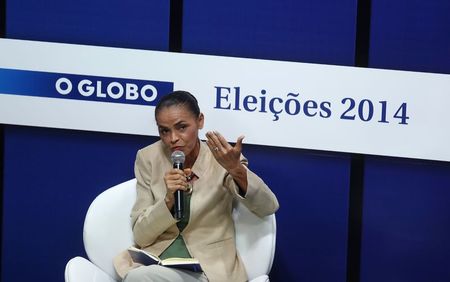By Anthony Boadle
BRASILIA (Reuters) - Brazilian President Dilma Rousseff has narrowed the lead of her top challenger, Marina Silva, to one percentage point in a potential runoff vote expected to follow the Oct. 5 first-round election, an opinion poll by pollster Ibope showed on Friday.
In a runoff, Silva has 43 percent support to 42 percent for Rousseff, said Ibope, which polled more than 2,000 people. The gap represents a statistical tie because it is within the survey's margin of error.
Silva had a seven-point lead in last week's Ibope poll. The survey was the latest evidence that Rousseff had recovered from Silva's dramatic surge earlier this month and that her strategy of criticizing the popular environmentalist is paying off.
Analysts said Silva, the widely favored contender just over a week ago, has hit her ceiling and the incumbent's more powerful political machine and media exposure have kicked in.
If Silva, Rousseff or any other candidate fail to win a majority of votes on Oct. 5, the top two finishers will face each other on Oct. 26.
In the first round, the poll found, support for Rousseff rose to 39 percent from 37 percent in last week's survey, while Silva's support fell to 31 percent from 33 percent, Ibope said. Support for centrist Aecio Neves, the market favorite, was unchanged at 15 percent.
With the race narrowing, candidates stepped up attacks on their rivals this week. Silva accused Rousseff of spreading lies about her after the president suggested she was in the arms of Brazil's banking elite.
Silva used a brewing bribery scandal involving a jailed former executive of oil firm Petroleo Brasileiro SA to accuse the ruling Workers' Party (PT) of planting him there to "raid the coffers" of the state-run company.
Former Petrobras director Paulo Roberto Costa, who was jailed in March in a money laundering probe, has alleged in a plea bargain statement leaked to weekly news magazine Veja that the company was at the center of a vast kickback scheme that channeled funds to government allies.
The allegations do not appear to have hurt Rousseff's campaign. The Ibope poll showed her government's approval rating rose to 38 percent from 36 percent a week ago.
"This will take time to filter down to the wider electorate. With the scant information leaked so far, Rousseff will be able to contain the scandal until after the elections," said Andre Cesar, an independent analyst in Brasilia.
Silva, an environmental activist-turned-anti-corruption campaigner, has vowed to restore trust in government by breaking with Brazil's murky coalition politics. Her anti-establishment stance has won her the backing of Brazilians who are fed up with traditional politicians.
A left-leaning economist, Rousseff is campaigning to expand social programs that lowered poverty during 12 years of Workers' Party rule. Investors blame her policies of state intervention in the economy for pushing Brazil into recession this year.

Ibope surveyed 2,002 respondents between Sept 5-8. The poll commissioned by the national industry lobbying group CNI has a margin of error of plus or minus two percentage points.
(Reporting by Anthony Boadle Editing by W Simon)
